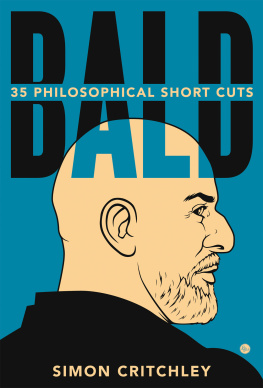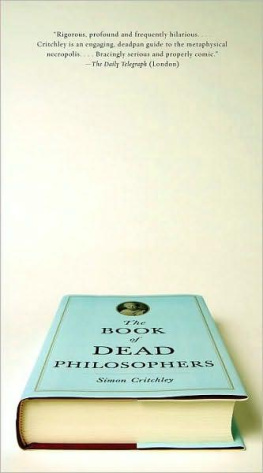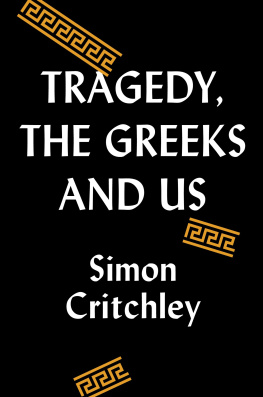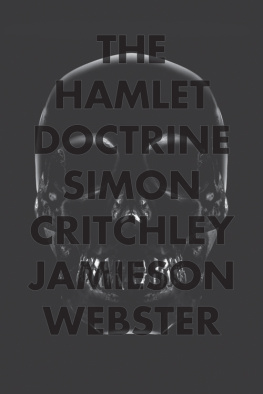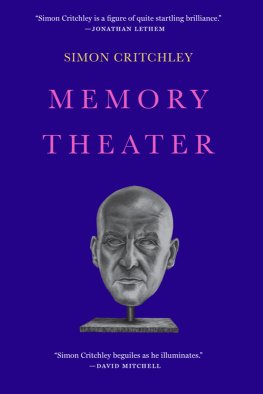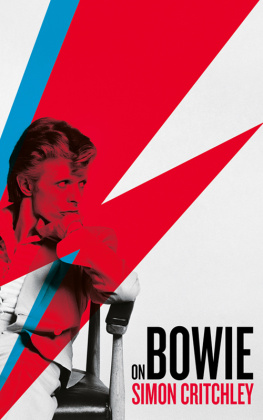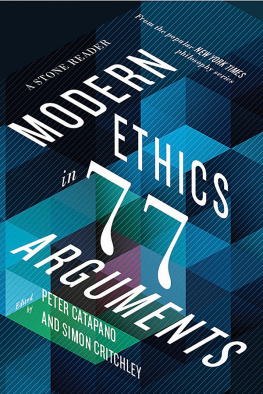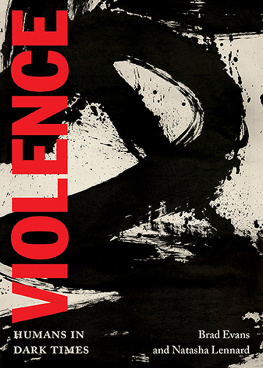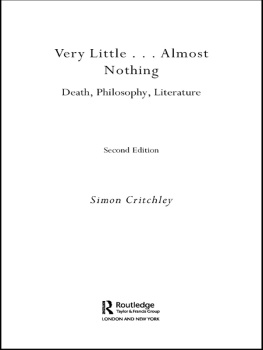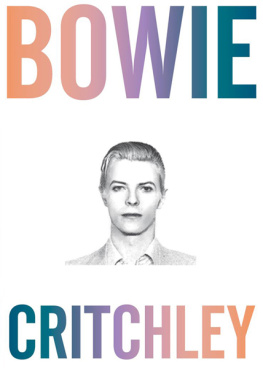Bald

Copyright 2021 by Simon Critchley.
All rights reserved.
This book may not be reproduced, in whole or in part, including illustrations, in any form (beyond that copying permitted by Sections 107 and 108 of the U.S. Copyright Law and except by reviewers for the public press), without written permission from the publishers.
Yale University Press books may be purchased in quantity for educational, business, or promotional use. For information, please e-mail (U.K. office).
Set in Minion type by IDS Infotech, Ltd.
Printed in the United States of America.
Library of Congress Control Number: 2020946698
ISBN 978-0-300-25596-6 (hardcover : alk. paper)
A catalogue record for this book is available from the British Library.
This paper meets the requirements of ANSI/NISO Z39.48-1992 (Permanence of Paper).
10 9 8 7 6 5 4 3 2 1
The Material was originally published in The New York Times.
Contents
Preface
Im bald. Aged around nineteen, I noticed that my frontal hairline had begun to recede on the sides, ever so subtly, and narrow into the clear V-shape of a widows peak. I made light of the fact with friends, safe in the knowledge that my father (who, according to my Uncle Ray, had an unusual terror of baldness) had the same hairline but had retained a thick head of dark hair until his death.
Later, around twenty-two or twenty-three, I kept finding hair on my pillow in the morning or clogged around the plughole in the bath. Rigging up an improvised apparatus, I tried to get a proper look at the back of my head. With the aid of an Anglepoise lamp on a desk and by kneeling in an attitude of prayer in front of a dressing mirror with a small shaving mirror in the palm of my right hand high above my head, I saw, indisputably, that the hair on the crown of my head was thinning, with patches of scalp visible through the brown wisps. I dont remember quite what I felt at the time, but it surely was not joy.
From then onlike the Roman Empiremy hair went into a long and irreversible decline and fall. Like many men, I tried a variety of increasingly desperate makeshift hairstyles, growing it, cutting it, parting it, shaping it this way and that, even using hair gel to generate the illusion of volume and luster (but never fully resorting to the dreaded comb-over). Around forty, in a barber shop in Sydney, I finally had it all shaved off and have remained a baldy ever since.
I heard that baldness depended on ones maternal grandfather. Mine had died relatively young, when I was about eight years old, so I studied black-and-white photos taken in Liverpool in the 1940s and 1950s. But my grandad, Tom Pearce, had a fine head of hair and an unusually low hairline above his unsmiling face (bad teeth). Since my other grandfathers hair looked like an old-fashioned thickly bristled doormat, I was perplexed.
My mother and my sister were both hairdressers and liked to experiment on me. Was this my revenge against them? I asked myself. My mother never forgave me for going bald. She was fond of declaring, often to no one in particular, Si, you used to have such lovely hair! Why did you lose it? I often wondered whether I had somehow conspired in my hairlessness.
The funny thing about being bald is that its perfectly all right for people, even in polite society, to point out the fact: Hey, baldy! Why is it considered acceptable to point out that men are involuntarily tonsured? I mean, its not all right to call someone fatty or shorty, but why are either explicit or surreptitious allusions to ones lack of hair considered an acceptable currency of social exchange? The happily hirsute world would be surprised how often this happens, often in sneaky and snide little quips.
In the Second Book of Kings, the bald biblical prophet Elisha was ridiculed by youths as he made his way to Bethel. Go up, you baldhead!, they shouted, or Stye up, ballard, as John Wycliffes fourteenth-century translation nicely puts it (the surname Ballard probably means bald head). After Elisha had cursed them, two female bears came out of the woods and mauled forty-two of the youths, which is quite a lot of youths.
Admittedly, this is going a little far. Female bears can be hard to find and no doubt harder to train. To be clear, I dont want to claim baldness as some kind of identity in a sport of competitive victimization, nor do I want to address some silent confederacy of the hairless and stir them up into a new political movement of the bald: Rise up, Ballards!
No, its a different sense of baldness that I want to draw attention to in framing the thirty-five essays in this book, written over the past decade or so for The New York Times. Let me explain with a joke. My father had three favorite gags. One involved Jesus on the cross and another was about a flatulent ballerina. His second-best joke was the following:
I never left the house as a child. My family were so poor that my mother couldnt afford to buy us clothes. When I was ten, my mother bought me a hat so that I could look out the window.
Maybe this is not the funniest joke in the world, but he used to fall about laughing after telling it, and so did I. He must have told it to me at least once a year.
The baldness that I want to emphasize here consists in not waiting for your mother to buy you a hat but sticking your head out of the window nonetheless. The essays collected here are my attempt to stick my bald head out of the window and think in public.
There are two main senses of the word bald: hairless and blunt, in the sense of a bald statement or speaking in a plain, unadorned, unveiled and indeed slightly stark way. As an academic, one gets used to speaking with a lot of protective headgear, which one can arrange into an elaborate scholastic toupee. Language can easily become covert, full of hesitations, clever qualifications, impersonal phrasing, passive voice constructions, subordinate clauses, intimidating polysyllabic jargon, name-dropping and arguments from authority. Life is often lived in the subjunctive mood, providing a wonderful excuse for poor prose. The academic protocols learned as a student can be shaped into a neat coiffure that one can wear under the scholars hood if one is fortunate enough to get paid to think for a living. The baldness of writing these little essays was something that I had to get used to. I had the learn the art of the philosophical short cut.
Here I have been greatly aided by the person who has edited every word in this book, Peter Catapano (who has great hair), and who always wanted my writing to be balder, more direct and honest, when I wanted to conceal matters under a hirsute mat of words. Most, if not all, of the essays in this book have been the outcome of a fight over prose with Peter; a fight which, I am happy to say, I invariably lost because of his better sense of the economy and directness of expression. The essays in this book are the outgrowth of The Stone, the philosophy column in The New York Times, which Peter and I plotted, planned and launched in 2010. Working with Peter on The Stone has been one of the great adventures in my life and shown that there is indeed a large audience for philosophy as long as the writing is clear, crisp and free of jargon and has a point to make.
Academic writing can look hard to produce, intimidating even. This is often intentional and disguises much obviousness of thought. Once one has passed through the various rites of passage, like acquiring a PhD, and gained access to the guild of professional philosophers (and professional philosophy is rather like a medieval guild with masters, mistresses and apprentices being duly and dully trained), then one can mouth the words and write articles and books that follow a predictably dreary pattern of supposed academic rigor, which can sometimes stiffen into rigor mortis. Writing short essays for a newspaper can be harder than academic writing because of the baldness of expression and the limitations of the form, especially the word limit. There is no space for academic wigs or comb-overs. One has to stick ones bald head out of the window and speak.
Next page
